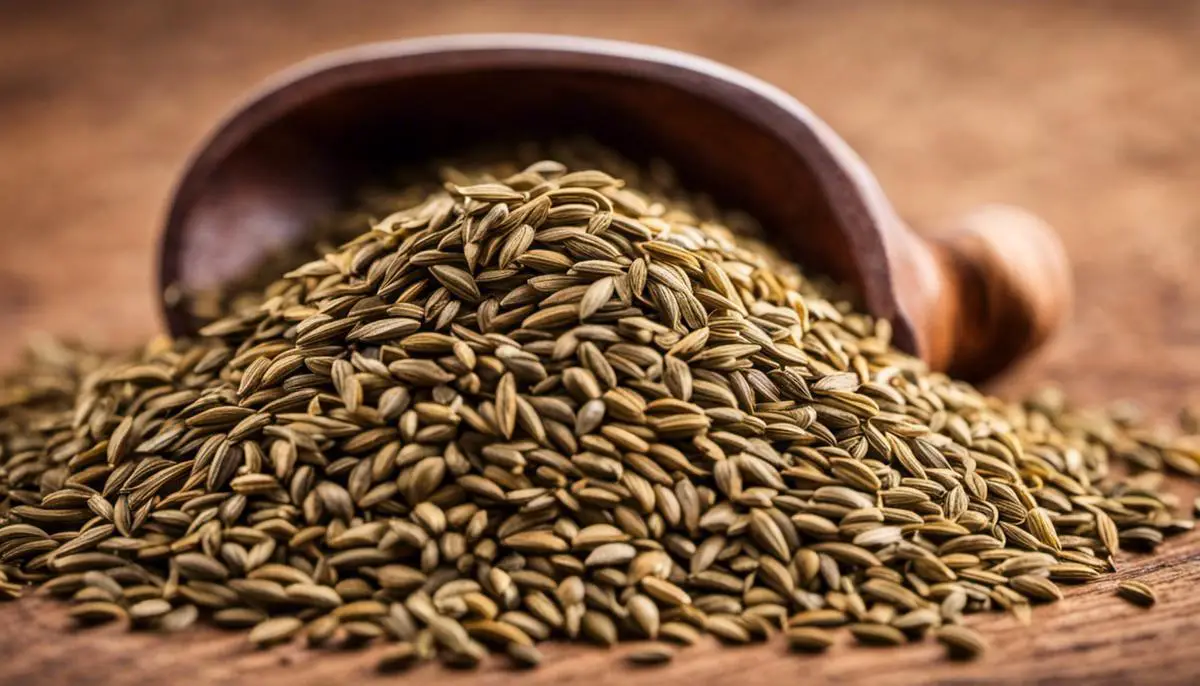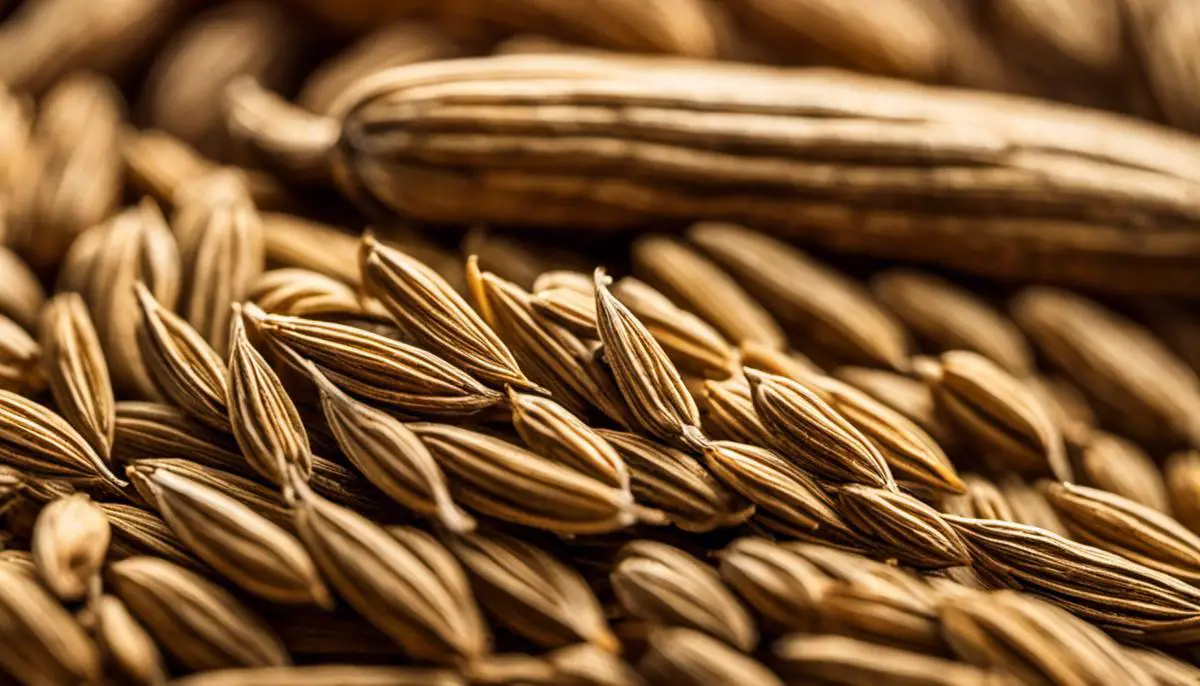This exploration illuminates the panorama of cumin seeds, a treasure trove of health benefits. Traced back to its origin and journey through history, cumin seeds host an array of uses both in the culinary and medicinal realms. Broaching beyond its pervasive flavor profile, cumin’s potential extends into our wellbeing, courtesy of its rich nutritional content. With numerous scientific studies lending weight to its health and medicinal properties, cumin presents several advantages in the areas of digestion, immune system support, weight management and diabetes among others.
Overview of Cumin Seeds
Overview of Cumin Seeds: History, Origin and Uses
Cumin seeds are ancient spices that have been used by mankind for thousands of years. Archaeologists have found cumin seeds in sites from the second millennium BC, making them one of the oldest spices in human history. Its origin was traced back to the East Mediterranean and India. These seeds have been mentioned in the Old Testament and were found in the tombs of the pharaohs in Egypt, showing its value and significance in ancient societies.
In the modern world, cumin seeds are used extensively in different global cuisines. These aromatic seeds, with their strong, warm flavor, are a key ingredient in curry powder and many spice blends in the Middle-East, Africa, Latin America, and Asia. They are typically used in dishes like stews, soups, bread, pickles, and even beverages for their unique flavor profile.
Cumin seeds also find wide usage in traditional medicine. They have been used to treat a variety of ailments, from digestion problems through to cardiovascular disease. Ancient Egyptians used it as a spice and a preservative in mummification, while in traditional Indian medicine (Ayurveda), cumin seeds are noted for their digestive properties and are used to treat problems such as bloating, indigestion, and bowel issues.
As a powerful source of iron, cumin seeds have an array of health-enhancing attributes. Just one teaspoon of crushed cumin seeds incorporates roughly 1.4 milligrams of iron, amounting to nearly 17.5% of the adult daily necessities. Essential for the formulation of red blood cells and energy sustainability, iron inculcates notable potential.
The seeds are also rich in antioxidants that counteract with harmful free radicals, ensuring our bodies are protected. Accompanied by dietary fiber, cumin seeds aid in efficient digestion and mitigates related disorders.
Significantly, manganese is also found in cumin seeds. This element is vital for maximizing the benefits of key nutrients like biotin, thiamine, and ascorbic acid. It also contributes to maintaining bone health and wound recovery.
The presence of B-complex vitamins in cumin seeds is noteworthy. They are notably abundant in thiamine (B1), riboflavin (B2), niacin (B3), and pyridoxine (vitamin B6). These vitamins have a pivotal role in fostering brain health, potentially reducing the risk of diseases such as Alzheimer’s and dementia.
Unveiling the Nutrient-Rich Cumin Seeds
Additionally, cumin seeds are loaded with calcium and magnesium that are essential for promoting robust bones, optimizing muscular functions, and regulating nervous system activities.
Considering this incredible nutrient composition, it’s little wonder that cumin seeds have been cherished as a dietary supplement throughout ages. From fortifying overall gut health to ensuring a balanced nutritional regime, cumin seeds deliver various health perks, making it more than just a flavorful spice.

Health Benefits of Cumin Seeds
Delving into the Health Benefits of Cumin Seeds
Known to be a potent spice, cumin seeds have a long-established usage in traditional medicine. Today, modern science also affirms its numerous health advantages.
Digestive Health and Metabolism
Cumin seeds have been found to support digestive health due to their natural enzyme content. This can increase the rate at which your body digests and absorbs nutrients from the food you eat. In Ayurvedic medicine, cumin seeds have long been valued for this digestive benefit.
Scientific studies have shown that cumin may also help improve your body’s metabolic rate. A higher metabolic rate can help with weight loss as it enables your body to burn calories more efficiently.
Immune System Enhancement
The cumin seed is rich in iron, an essential mineral for proper functioning of the immune system. This warming spice has significant amounts of vitamin C, known for its immune-boosting properties. Cumin also contains numerous antioxidants, which can combat harmful free radicals and prevent oxidative stress. These factors help boost the immune system and guard against common illnesses.
Regulation of Blood Sugar Levels
Research has illuminated the potential benefits of cumin seeds for individuals with diabetes. In some animal studies, cumin extract has been found to lower blood sugar levels and improve insulin sensitivity. However, additional research on humans is needed to fully understand this relationship and suggest cumin as a potential treatment for diabetes.
Promotion of Weight Loss
Cumin may assist in weight loss effort as well. Small-scale studies have suggested that consuming cumin seeds may increase feelings of fullness and promote weight loss. This could be attributed to the seeds’ high fiber content and its potential to boost the metabolic rate.
Potential Anti-carcinogenic Properties
Preliminary research indicates that cumin seeds may have anti-cancer properties. Some laboratory studies on animals have demonstrated that cumin might reduce the risk of certain kinds of cancers. It is speculated that the antioxidant properties of cumin could be responsible for these potential benefits. Nevertheless, more comprehensive studies are necessary to confirm these findings and understand the processes involved.
Before you add cumin seeds to your diet for their numerous potential health benefits, it’s critical to note that they are not intended as a substitute for conventional medical care. Seek advice from a healthcare professional prior to introducing any significant changes to your diet.

Side effects and safety precautions
Considerations for Side Effects Caused by Cumin Seeds
Generally, cumin seeds are safe for most people when ingested in moderation. Nevertheless, consuming them excessively may result in digestive issues, including stomach pain, nausea, diarrhea, and bloating. Additionally, high quantities of cumin seeds could potentially reduce blood sugar levels. This may pose a risk for people with diabetes if not carefully monitored and managed.
Allergic Reactions to Cumin Seeds
Allergic reactions to cumin seeds, while not common, can occur in some individuals. Symptoms of a food allergy can range from mild to severe and can include skin rash, nausea, vomiting, cramping, and diarrhea. In severe cases, cumin seed allergy could potentially trigger a serious reaction called anaphylaxis, which is a medical emergency requiring immediate attention.
Complications During Pregnancy and Breastfeeding
There is not enough reliable information about the safety of taking cumin in medicinal amounts during pregnancy or breastfeeding. Although cumin is widely used in cooking and is likely safe in food amounts, consuming cumin in larger doses might pose risks. It’s best to stick to food amounts if you’re pregnant or breastfeeding.
Cumin Seeds and Blood Clotting
Cumin might slow blood clotting. Consuming cumin in excess can potentially increase the risk of bleeding in individuals with bleeding disorders. It can also affect blood sugar levels and could interfere with blood sugar control during and after surgical procedures. Therefore, it’s advisable to stop using cumin at least 2 weeks before a scheduled surgery.
Interaction with Medication
Cumin seeds could interact with certain medications. For example, because cumin might decrease blood sugar, consuming it in combination with diabetes medications could cause your blood sugar to go too low. Additionally, because cumin might slow blood clotting, combining it with anticoagulant or antiplatelet drugs could increase the chances of bruising and bleeding.
Cumin seeds, known for their myriad health advantages, should be consumed responsibly in your daily routine. If you suffer from any specific health condition or are undergoing any medication treatment, we strongly advise consulting with your healthcare provider before incorporating significant amounts of cumin seeds into your dietary habits.

Incorporating Cumin Seeds into Diet
Integrating Cumin Seeds in the Eating Plan
For centuries, cumin seeds have been a crucial part of different culinary practices around the world, particularly admired for their unique warm taste. They have secured their place within Middle Eastern, Indian, and Mexican dishes especially. Cumin seeds boast a wide range of antioxidants and have been associated with a plethora of health benefits such as better digestion, reduced inflammation, and efficient blood sugar management.
How to Use Cumin Seeds
One of the much-appreciated aspects about cumin seeds is that you can incorporate them into your diet in multiple ways. You may use it raw, roasted, or ground into a powder. When raw, it has a much stronger taste, whereas roasting it mellows the flavor down a bit. The roasted seeds can be consumed directly or used in a dish. It’s also common to use ground cumin seed which is often sold under the name of ‘cumin powder’.
Incorporating cumin seeds into daily meals is easy. They can be thrown into virtually any savory dish – soups, stews, chili, curry, rice, lentils, and meat rubs. Another simple way to incorporate cumin is by tossing it into a salad or using it in a marinade.
Benefits of Cumin Seeds
Cumin seeds are packed with antioxidants and are known to have various health benefits. The seeds are rich in iron, which can help promote circulation and improve energy levels. The presence of antioxidants in cumin seeds contributes to weight loss, improves digestion, and helps control cholesterol. Cumin seeds have been used for centuries for their potential to impact digestive health positively. In addition, they have antimicrobial properties that can help fight harmful bacteria and even certain types of fungi.
Studies have shown that cumin may be effective in managing diabetes. It can help reduce blood sugar levels and potentially combat the prolonged effects of diabetes. Research also indicates that cumin may improve cholesterol levels, which in turn supports good heart health.
Easy-to-Make Recipes
Cumin seeds can be infused in tea as well. Boil a teaspoon of cumin seeds in two cups of water till it reduces to half, strain the seeds, and your cumin tea is ready!
One simple recipe with cumin as a star ingredient is Cumin Rice. Heat up two tablespoons of oil in a pot, add one teaspoon of cumin seeds and saute until they turn brown. Add two cups of rice to the pot, stir for a few minutes, and then add four cups of water. Once the water starts boiling, reduce the heat and cover the pot. Simmer for about 20 minutes, and your cumin rice is ready to serve.
Cumin seeds can be a healthful addition to your diet, not only for their subtle flavor but also for their numerous possible health benefits. Its versatility in various dishes and cuisines ensures that there’s a place for cumin in any home kitchen. By incorporating this spice into your daily meals, you will be investing in a healthier lifestyle.

While the consumption of cumin seeds poses few side effects, understanding potential risks or allergies is paramount, particularly for specific individuals or conditions. Equally important is to consider methods of incorporating this spice into the daily diet. Simple yet tasteful recipes enriched with this nutrient-packed seed can pave the way to a healthier lifestyle. Thus, through discerning consumption, the humble cumin seed can standing prominently as a potent and beneficial ally on the journey towards improved health and wellness.
Discover more from Fertilitylens
Subscribe to get the latest posts sent to your email.










